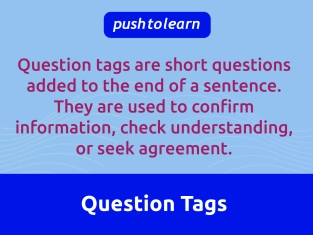by PushtoLearn
Palabras Interrogativas
Tabla de contenidos
Ejercicios de Palabras Interrogativas
Estos ejercicios se enfocan en las palabras interrogativas.
¿Qué son las Palabras Interrogativas?
Las palabras interrogativas se usan para preguntar sobre diferentes tipos de información. Cada palabra tiene un propósito específico:
|
Palabra Interrogativa |
Uso |
Ejemplo de Pregunta |
|
What |
Preguntar sobre cosas o acciones |
What is your favorite color? |
|
Where |
Preguntar sobre lugares |
Where do you live? |
|
When |
Preguntar sobre el tiempo |
When is your birthday? |
|
Who |
Preguntar sobre personas |
Who is your teacher? |
|
Why |
Preguntar sobre razones |
Why are you late? |
|
How |
Preguntar sobre maneras o métodos |
How do you go to school? |
|
Which |
Preguntar para elegir entre opciones |
Which book do you want to read? |
|
Whose |
Preguntar sobre pertenencia |
Whose bag is this? |

Cómo Formar Preguntas
1. Estructura de las Preguntas
La mayoría de las preguntas con palabras interrogativas siguen esta estructura:
Palabra Interrogativa + Verbo Auxiliar + Sujeto + Verbo Principal
Ejemplos:
-
What do you like?
-
Where is your house?
-
When can we meet?
2. Preguntas con "Be"
Si el verbo es "to be" (am, is, are), la estructura es ligeramente diferente:
Palabra Interrogativa + Verbo "Be" + Sujeto
Ejemplos:
-
Where is he?
-
Who are they?
3. Respuestas Cortas
Al responder una pregunta con una palabra interrogativa, da solo la información necesaria:
Pregunta: Where do you live?
Respuesta: In London.
Pregunta: What is your name?
Respuesta: Anna.
Errores Comunes
|
❌ Error |
Por qué está mal |
✅ Versión Correcta |
|
Where you live? |
Falta el verbo auxiliar (do). |
Where do you live? |
|
What is she doing? (She singing.) |
Forma incorrecta del verbo en la respuesta. |
She is singing. |
|
When you are coming? |
Orden incorrecto de las palabras. El verbo debe ir después del sujeto. |
When are you coming? |
Ejemplos en el Uso Diario
Aquí hay algunos ejemplos de cómo se usan las palabras interrogativas en la vida cotidiana:
-
What: What is your favorite movie?
-
Where: Where do you work?
-
When: When is the party?
-
Who: Who is calling you?
-
Why: Why are you sad?
-
How: How do you cook this dish?
-
Which: Which shirt should I wear?
-
Whose: Whose phone is ringing?
Reglas a Recordar
-
Siempre usa el verbo auxiliar correcto con el sujeto:
✅ What does she like?
✅ Where do they go? -
Para preguntas con el verbo "to be", no agregues "do":
✅ Where is the book?
❌ Where does is the book? -
Usa la palabra interrogativa correcta según la información que necesitas:
-
What: para cosas o acciones.
-
Where: para lugares.
-
Why: para razones.
Preguntas Frecuentes sobre Palabras Interrogativas
¿Cuál es la diferencia entre "What" y "Which"?
-
"What" se usa para preguntas generales.
-
"Which" se usa cuando hay opciones específicas.
✅ What is your favorite food?
✅ Which dress do you prefer—the red or the blue one?
¿Puedo usar "Do" en todas las preguntas?
No. Usa do/does con la mayoría de los verbos, pero no con el verbo to be o verbos modales como can o should.
✅ What do you eat?
✅ Where is he?
¿Por qué se usa "Whose"?
"Whose" se usa para preguntar sobre posesión o pertenencia.
✅ Whose car is this? (Es mío.)
¿"How" solo se usa para métodos?
No, how también se usa con adjetivos o cantidades:
✅ How are you?
✅ How many apples do you have?
¿Cómo puedo practicar las palabras interrogativas?
Practica haciendo y respondiendo preguntas sobre tu vida diaria. Por ejemplo:
✅ Where do you go in the morning?
✅ What do you eat for breakfast?

